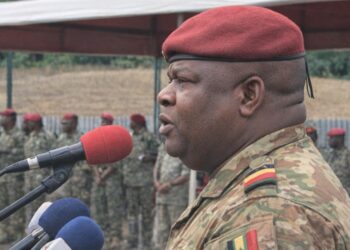A ceremonial overture in Brazzaville
The cavernous hall of Brazzaville’s Palais des Congrès was already vibrating with anticipation when President Denis Sassou Nguesso crossed the stage on 19 July 2025 to inaugurate the twelfth Pan-African Music Festival. A flourish by the Republican Guard’s brass ensemble, each musician draped in the colours of a different African member state, transformed the venue into a continental agora. In the front rows, Prime Minister Anatole Collinet Makosso, Culture Minister Yolande Elebe Ma Ndembo and a roster of ambassadors punctuated the diplomatic tableau, a reminder that culture remains an indispensable instrument of statecraft.
A video message from UNESCO Director-General Audrey Azoulay, delivered through her special envoy Fatoumata Barry Marega, conferred further gravitas, commending Congo’s logistical commitment while honouring the late Malian virtuoso Amadou Bagayoko. The confluence of protocol and artistic exuberance set the tone for a week during which music is expected to resonate far beyond concert halls, permeating policy debates on economic diversification and digital transition.
Soft power calculus of cultural pageantry
From Bandung to Rio, cultural festivals have long served as geopolitical amplifiers; Brazzaville’s FESPAM is no exception. The Congolese presidency has consistently framed the event as a venue where ‘Africa speaks to itself before speaking to the world’, a formulation that recalls the soft-power doctrine articulated by the African Union’s Agenda 2063 (African Union 2023). By convening performers from Kinshasa to Kingston, the festival not only projects an image of stability but also offers international partners a carefully curated window into Congo’s governance priorities.
Diplomats interviewed on the side-lines emphasised that the symbolic investment is modest compared with the reputational dividends. A European chargé d’affaires described the ceremony as ‘a textbook exercise in nation branding’, while a West African cultural attaché highlighted the advantage of positioning Brazzaville as a neutral cultural broker amid regional turbulences. In this sense, FESPAM contributes to what analysts at the Institute for Security Studies call ‘preventive diplomacy by celebration’, fostering a milieu of shared heritage rather than zero-sum rivalry.
Creative industries and the digital marketplace
This year’s theme, ‘Music and Economic Stakes in the Digital Era’, anchors the festival in the policy conversation around Africa’s creative economy, now valued at roughly 58 billion USD and growing at 5 percent annually (UNESCO Institute for Statistics 2024). Minister of Cultural Industries Marie-France Lydie Hélène Pongault framed FESPAM as a laboratory for monetising intellectual property, underscoring the government’s intent to align with the African Continental Free Trade Area’s protocol on digital trade.
Panels on blockchain-enabled royalties and streaming-service taxation are designed to attract venture capitalists scouting for frontier markets. Representatives from Congolese start-ups such as Baziks Pulse discussed licensing models tailored to francophone audiences, while regional telecom operators explored bundling local content into low-bandwidth subscriptions. The presence of these actors signals an incremental but discernible policy shift: cultural prestige is increasingly inseparable from revenue generation and technological infrastructure.
Youth agency and regional integration ambitions
More than half of Congo’s population is under 24, a demographic fact that shapes both the festival’s programming and its socioeconomic aspirations. Performances by poet-rapper Mariusca La Slameuse and the Franco-Congolese troupe Danseincolor foregrounded youth narratives of mobility, gender equity and digital literacy. Their choreography, alternating between traditional rhythms and Afro-trap cadences, embodied the festival’s credo that cultural authenticity need not clash with modern entrepreneurial zeal.
By allocating prime slots to emerging collectives, organisers respond to continental studies that link creative self-employment to reduced urban unemployment (World Bank 2024). Regional observers view this strategy as complementary to economic-integration projects such as the Kinshasa-Brazzaville Special Economic Zone, slated to facilitate cross-border movement of both goods and artists. In that sense, FESPAM rehearses, on a cultural stage, the harmonisation that diplomats negotiate in boardrooms.
International endorsements bolster credibility
The diplomatic visibility of FESPAM received a significant lift from multilateral agencies. UNESCO’s renewed patronage dovetails with its 2005 Convention on the Protection and Promotion of the Diversity of Cultural Expressions, to which Congo-Brazzaville is an early signatory. The United Nations Economic Commission for Africa dispatched analysts to gather data on creative-sector value chains, signalling that conversations launched in panel rooms could translate into technical-assistance programmes.
Private-sector endorsements also abound. A memorandum of understanding between the Congolese Ministry of Posts, Telecommunications and the Digital Economy and a pan-African streaming platform was initialled on the festival’s sidelines, pledging to localise 10 000 titles by 2026. Such agreements offer tangible metrics by which observers can gauge whether the festival’s slogans translate into sustained economic impact.
A measured outlook for Congo’s cultural economy
As the President declared the festival open with the benediction ‘Que la fête soit belle’, attendees erupted in approval, yet policymakers remained attentive to underlying structural challenges. Supply-chain bottlenecks for musical instruments and uneven broadband penetration still inhibit full monetisation of artistic output, realities acknowledged by Commissioner-General Hugues Gervais Ondaye, who opted for a scaled-down edition to safeguard quality.
Nevertheless, the festival’s orchestration offers a pragmatic case study in leveraging culture for diplomatic traction and economic diversification. By situating FESPAM at the intersection of soft power, digital innovation and youth empowerment, Congo-Brazzaville articulates a forward-looking narrative that resonates in regional and multilateral fora. The week-long celebration in Brazzaville may thus be read as both performance and policy rehearsal, a synchronised effort to ensure that the rhythm of development keeps tempo with the aspirations of a youthful continent.












































